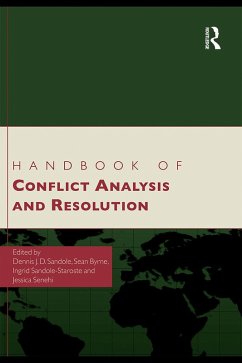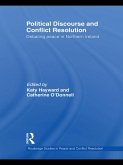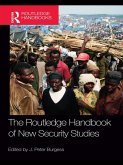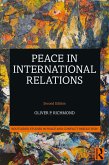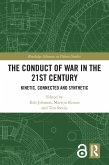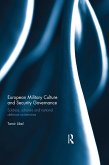Dennis J. D. Sandole, Sean Byrne, Ingrid Sandole-Staroste, Jessica Senehi
Handbook of Conflict Analysis and Resolution (eBook, PDF)
52,95 €
52,95 €
inkl. MwSt.
Sofort per Download lieferbar

26 °P sammeln
52,95 €
Als Download kaufen

52,95 €
inkl. MwSt.
Sofort per Download lieferbar

26 °P sammeln
Jetzt verschenken
Alle Infos zum eBook verschenken
52,95 €
inkl. MwSt.
Sofort per Download lieferbar
Alle Infos zum eBook verschenken

26 °P sammeln
Dennis J. D. Sandole, Sean Byrne, Ingrid Sandole-Staroste, Jessica Senehi
Handbook of Conflict Analysis and Resolution (eBook, PDF)
- Format: PDF
- Merkliste
- Auf die Merkliste
- Bewerten Bewerten
- Teilen
- Produkt teilen
- Produkterinnerung
- Produkterinnerung

Bitte loggen Sie sich zunächst in Ihr Kundenkonto ein oder registrieren Sie sich bei
bücher.de, um das eBook-Abo tolino select nutzen zu können.
Hier können Sie sich einloggen
Hier können Sie sich einloggen
Sie sind bereits eingeloggt. Klicken Sie auf 2. tolino select Abo, um fortzufahren.

Bitte loggen Sie sich zunächst in Ihr Kundenkonto ein oder registrieren Sie sich bei bücher.de, um das eBook-Abo tolino select nutzen zu können.
This major Handbook is a collection of work from leading scholars in the Conflict Analysis and Resolution (CAR) field. The central theme is the value of interdisciplinary approaches to the analysis and resolution of conflicts.
- Geräte: PC
- mit Kopierschutz
- eBook Hilfe
- Größe: 2.39MB
Andere Kunden interessierten sich auch für
![Political Discourse and Conflict Resolution (eBook, PDF) Political Discourse and Conflict Resolution (eBook, PDF)]() Political Discourse and Conflict Resolution (eBook, PDF)55,95 €
Political Discourse and Conflict Resolution (eBook, PDF)55,95 €![Conflict Management and Resolution (eBook, PDF) Conflict Management and Resolution (eBook, PDF)]() Ho-Won JeongConflict Management and Resolution (eBook, PDF)45,95 €
Ho-Won JeongConflict Management and Resolution (eBook, PDF)45,95 €![The Routledge Handbook of New Security Studies (eBook, PDF) The Routledge Handbook of New Security Studies (eBook, PDF)]() The Routledge Handbook of New Security Studies (eBook, PDF)49,95 €
The Routledge Handbook of New Security Studies (eBook, PDF)49,95 €![Peace in International Relations (eBook, PDF) Peace in International Relations (eBook, PDF)]() Oliver P. RichmondPeace in International Relations (eBook, PDF)39,95 €
Oliver P. RichmondPeace in International Relations (eBook, PDF)39,95 €![Encyclopedia of Modern War (eBook, PDF) Encyclopedia of Modern War (eBook, PDF)]() Roger ParkinsonEncyclopedia of Modern War (eBook, PDF)30,95 €
Roger ParkinsonEncyclopedia of Modern War (eBook, PDF)30,95 €![The Conduct of War in the 21st Century (eBook, PDF) The Conduct of War in the 21st Century (eBook, PDF)]() The Conduct of War in the 21st Century (eBook, PDF)39,95 €
The Conduct of War in the 21st Century (eBook, PDF)39,95 €![European Military Culture and Security Governance (eBook, PDF) European Military Culture and Security Governance (eBook, PDF)]() Tamir LibelEuropean Military Culture and Security Governance (eBook, PDF)45,95 €
Tamir LibelEuropean Military Culture and Security Governance (eBook, PDF)45,95 €-
-
-
This major Handbook is a collection of work from leading scholars in the Conflict Analysis and Resolution (CAR) field. The central theme is the value of interdisciplinary approaches to the analysis and resolution of conflicts.
Dieser Download kann aus rechtlichen Gründen nur mit Rechnungsadresse in A, B, BG, CY, CZ, D, DK, EW, E, FIN, F, GR, HR, H, IRL, I, LT, L, LR, M, NL, PL, P, R, S, SLO, SK ausgeliefert werden.
Produktdetails
- Produktdetails
- Verlag: Taylor & Francis eBooks
- Seitenzahl: 576
- Erscheinungstermin: 31. Juli 2008
- Englisch
- ISBN-13: 9781134079636
- Artikelnr.: 42367700
- Verlag: Taylor & Francis eBooks
- Seitenzahl: 576
- Erscheinungstermin: 31. Juli 2008
- Englisch
- ISBN-13: 9781134079636
- Artikelnr.: 42367700
- Herstellerkennzeichnung Die Herstellerinformationen sind derzeit nicht verfügbar.
Dennis J. D. Sandole is Professor of Conflict Resolution and International Relations at the Institute for Conflict Analysis and Resolution, George Mason University, USA. Sean Byrne is Professor of Peace and Conflict Studies and Founding Director of the Arthur V. Mauro Centre for Peace and Justice, St. Paul's College, University of Manitoba, Canada. Ingrid Sandole-Staroste is Adjunct Professor in the Department of Sociology, Global Affairs and Women's Studies Programs at George Mason University, USA. Jessica Senehi is Assistant Professor of Peace and Conflict Studies and Associate Director of the Arthur V. Mauro Centre for Peace and Justice, St. Paul's College, University of Manitoba, Canada.
Part 1: Core Concepts and Theories 1. The Role of Identity in Conflict 2.
Encountering Nationalism: The Contribution of Peace Studies and Conflict
Resolution 3. Gender Relations and Conflict Transformation Among Refugee
Women 4. Causation as a Core Concept in Conflict Analysis 5. The Challenge
of Operationalizing Key Concepts in Conflict Resolution Theory in
International and Subnational Conflicts 6. The Enemy and the Innocent of
Violent Conflicts 7. Identity Conflicts: Models of Dynamics and Early
Warning 8. Generativity-Based Conflict: Maturing Micro Foundations for
Conflict Theory Part 2: Core Approaches: Conceptual and Methodological 9.
Human Agonistes: Interdisciplinary Inquiry into Ontological Agency and
Human Conflict 10. The Ethnography of Peace Education: Some Lessons Learned
from Palestinian-Jewish Integrated Education in Israel 11. Waging Conflicts
Constructively 12. A Social-Psychological Approach to Conflict Analysis and
Resolution 13. Building Relational Empathy Through An Interactive Design
Process 14. Building Peace: Storytelling to Transform Conflicts
Constructively 15. A Capacity Building Approach to Conflict Resolution 16.
Gender Mainstreaming: A Valuable Tool in Building Sustainable Peace 17.
Culture Theory, Culture Clash, and the Practice of Conflict Resolution 18.
Conflict Resolution: The Missing Link between Liberal IR Theory and
Realistic Practice 19. Understanding the Development-Conflict Nexus and the
Contribution of Development Cooperation to Peacebuilding 20. Evaluation in
Conflict Resolution and Peacebuilding 21. Toward A Conflictology: The Quest
for Trans-Disciplinarity Part 3: Core Practices: Processes 22. Conflict
Transformation: Reasons to be Modest 23. Mediation Frames/Justice Games
24. Interactive Conflict Resolution: Dialogue, Conflict Analysis and
Problem Solving 25. Mediation and International Conflict Resolution:
Analyzing Structure and Behavior 26. Ethical and Gendered Dilemmas of
Moving from Emergency Response to Development in "Failed" States 27.
Memory-Retrieval and Truth-Recovery 28. Shifting from Coherent Towards
Holistic Peace Processes 29. Law and Legal Processes in Resolving
International Conflicts Part 4: Alternative Voices and Complex Intervention
Designs 30. Restorative Processes of Peace and Healing within the Governing
Structures of the Rotinonshonni "Longhouse People" 31. Critical Systematic
Inquiry in Conflict Analysis and Resolution: An Essential Bridge between
Theory and Practice 32. From Diagnosis to Treatment: Towards New Shared
Principles for Israeli/Palestinian Peacebuilding 33. Strategies for the
Prevention, Management and/or Resolution of (Ethnic) Crisis and Conflict:
The Case of the Balkans 34. The Perception of Economic Assistance in
Northern Ireland and Its Role in the Peace Process 35. Conflict Resolution
in An Age of Empire: New Challenges to an Emerging Field Conclusions
Conclusion: Revisiting the CAR Field Epilogue: Implications for Theory,
Research, Practice and Teaching
Encountering Nationalism: The Contribution of Peace Studies and Conflict
Resolution 3. Gender Relations and Conflict Transformation Among Refugee
Women 4. Causation as a Core Concept in Conflict Analysis 5. The Challenge
of Operationalizing Key Concepts in Conflict Resolution Theory in
International and Subnational Conflicts 6. The Enemy and the Innocent of
Violent Conflicts 7. Identity Conflicts: Models of Dynamics and Early
Warning 8. Generativity-Based Conflict: Maturing Micro Foundations for
Conflict Theory Part 2: Core Approaches: Conceptual and Methodological 9.
Human Agonistes: Interdisciplinary Inquiry into Ontological Agency and
Human Conflict 10. The Ethnography of Peace Education: Some Lessons Learned
from Palestinian-Jewish Integrated Education in Israel 11. Waging Conflicts
Constructively 12. A Social-Psychological Approach to Conflict Analysis and
Resolution 13. Building Relational Empathy Through An Interactive Design
Process 14. Building Peace: Storytelling to Transform Conflicts
Constructively 15. A Capacity Building Approach to Conflict Resolution 16.
Gender Mainstreaming: A Valuable Tool in Building Sustainable Peace 17.
Culture Theory, Culture Clash, and the Practice of Conflict Resolution 18.
Conflict Resolution: The Missing Link between Liberal IR Theory and
Realistic Practice 19. Understanding the Development-Conflict Nexus and the
Contribution of Development Cooperation to Peacebuilding 20. Evaluation in
Conflict Resolution and Peacebuilding 21. Toward A Conflictology: The Quest
for Trans-Disciplinarity Part 3: Core Practices: Processes 22. Conflict
Transformation: Reasons to be Modest 23. Mediation Frames/Justice Games
24. Interactive Conflict Resolution: Dialogue, Conflict Analysis and
Problem Solving 25. Mediation and International Conflict Resolution:
Analyzing Structure and Behavior 26. Ethical and Gendered Dilemmas of
Moving from Emergency Response to Development in "Failed" States 27.
Memory-Retrieval and Truth-Recovery 28. Shifting from Coherent Towards
Holistic Peace Processes 29. Law and Legal Processes in Resolving
International Conflicts Part 4: Alternative Voices and Complex Intervention
Designs 30. Restorative Processes of Peace and Healing within the Governing
Structures of the Rotinonshonni "Longhouse People" 31. Critical Systematic
Inquiry in Conflict Analysis and Resolution: An Essential Bridge between
Theory and Practice 32. From Diagnosis to Treatment: Towards New Shared
Principles for Israeli/Palestinian Peacebuilding 33. Strategies for the
Prevention, Management and/or Resolution of (Ethnic) Crisis and Conflict:
The Case of the Balkans 34. The Perception of Economic Assistance in
Northern Ireland and Its Role in the Peace Process 35. Conflict Resolution
in An Age of Empire: New Challenges to an Emerging Field Conclusions
Conclusion: Revisiting the CAR Field Epilogue: Implications for Theory,
Research, Practice and Teaching
Part 1: Core Concepts and Theories 1. The Role of Identity in Conflict 2.
Encountering Nationalism: The Contribution of Peace Studies and Conflict
Resolution 3. Gender Relations and Conflict Transformation Among Refugee
Women 4. Causation as a Core Concept in Conflict Analysis 5. The Challenge
of Operationalizing Key Concepts in Conflict Resolution Theory in
International and Subnational Conflicts 6. The Enemy and the Innocent of
Violent Conflicts 7. Identity Conflicts: Models of Dynamics and Early
Warning 8. Generativity-Based Conflict: Maturing Micro Foundations for
Conflict Theory Part 2: Core Approaches: Conceptual and Methodological 9.
Human Agonistes: Interdisciplinary Inquiry into Ontological Agency and
Human Conflict 10. The Ethnography of Peace Education: Some Lessons Learned
from Palestinian-Jewish Integrated Education in Israel 11. Waging Conflicts
Constructively 12. A Social-Psychological Approach to Conflict Analysis and
Resolution 13. Building Relational Empathy Through An Interactive Design
Process 14. Building Peace: Storytelling to Transform Conflicts
Constructively 15. A Capacity Building Approach to Conflict Resolution 16.
Gender Mainstreaming: A Valuable Tool in Building Sustainable Peace 17.
Culture Theory, Culture Clash, and the Practice of Conflict Resolution 18.
Conflict Resolution: The Missing Link between Liberal IR Theory and
Realistic Practice 19. Understanding the Development-Conflict Nexus and the
Contribution of Development Cooperation to Peacebuilding 20. Evaluation in
Conflict Resolution and Peacebuilding 21. Toward A Conflictology: The Quest
for Trans-Disciplinarity Part 3: Core Practices: Processes 22. Conflict
Transformation: Reasons to be Modest 23. Mediation Frames/Justice Games
24. Interactive Conflict Resolution: Dialogue, Conflict Analysis and
Problem Solving 25. Mediation and International Conflict Resolution:
Analyzing Structure and Behavior 26. Ethical and Gendered Dilemmas of
Moving from Emergency Response to Development in "Failed" States 27.
Memory-Retrieval and Truth-Recovery 28. Shifting from Coherent Towards
Holistic Peace Processes 29. Law and Legal Processes in Resolving
International Conflicts Part 4: Alternative Voices and Complex Intervention
Designs 30. Restorative Processes of Peace and Healing within the Governing
Structures of the Rotinonshonni "Longhouse People" 31. Critical Systematic
Inquiry in Conflict Analysis and Resolution: An Essential Bridge between
Theory and Practice 32. From Diagnosis to Treatment: Towards New Shared
Principles for Israeli/Palestinian Peacebuilding 33. Strategies for the
Prevention, Management and/or Resolution of (Ethnic) Crisis and Conflict:
The Case of the Balkans 34. The Perception of Economic Assistance in
Northern Ireland and Its Role in the Peace Process 35. Conflict Resolution
in An Age of Empire: New Challenges to an Emerging Field Conclusions
Conclusion: Revisiting the CAR Field Epilogue: Implications for Theory,
Research, Practice and Teaching
Encountering Nationalism: The Contribution of Peace Studies and Conflict
Resolution 3. Gender Relations and Conflict Transformation Among Refugee
Women 4. Causation as a Core Concept in Conflict Analysis 5. The Challenge
of Operationalizing Key Concepts in Conflict Resolution Theory in
International and Subnational Conflicts 6. The Enemy and the Innocent of
Violent Conflicts 7. Identity Conflicts: Models of Dynamics and Early
Warning 8. Generativity-Based Conflict: Maturing Micro Foundations for
Conflict Theory Part 2: Core Approaches: Conceptual and Methodological 9.
Human Agonistes: Interdisciplinary Inquiry into Ontological Agency and
Human Conflict 10. The Ethnography of Peace Education: Some Lessons Learned
from Palestinian-Jewish Integrated Education in Israel 11. Waging Conflicts
Constructively 12. A Social-Psychological Approach to Conflict Analysis and
Resolution 13. Building Relational Empathy Through An Interactive Design
Process 14. Building Peace: Storytelling to Transform Conflicts
Constructively 15. A Capacity Building Approach to Conflict Resolution 16.
Gender Mainstreaming: A Valuable Tool in Building Sustainable Peace 17.
Culture Theory, Culture Clash, and the Practice of Conflict Resolution 18.
Conflict Resolution: The Missing Link between Liberal IR Theory and
Realistic Practice 19. Understanding the Development-Conflict Nexus and the
Contribution of Development Cooperation to Peacebuilding 20. Evaluation in
Conflict Resolution and Peacebuilding 21. Toward A Conflictology: The Quest
for Trans-Disciplinarity Part 3: Core Practices: Processes 22. Conflict
Transformation: Reasons to be Modest 23. Mediation Frames/Justice Games
24. Interactive Conflict Resolution: Dialogue, Conflict Analysis and
Problem Solving 25. Mediation and International Conflict Resolution:
Analyzing Structure and Behavior 26. Ethical and Gendered Dilemmas of
Moving from Emergency Response to Development in "Failed" States 27.
Memory-Retrieval and Truth-Recovery 28. Shifting from Coherent Towards
Holistic Peace Processes 29. Law and Legal Processes in Resolving
International Conflicts Part 4: Alternative Voices and Complex Intervention
Designs 30. Restorative Processes of Peace and Healing within the Governing
Structures of the Rotinonshonni "Longhouse People" 31. Critical Systematic
Inquiry in Conflict Analysis and Resolution: An Essential Bridge between
Theory and Practice 32. From Diagnosis to Treatment: Towards New Shared
Principles for Israeli/Palestinian Peacebuilding 33. Strategies for the
Prevention, Management and/or Resolution of (Ethnic) Crisis and Conflict:
The Case of the Balkans 34. The Perception of Economic Assistance in
Northern Ireland and Its Role in the Peace Process 35. Conflict Resolution
in An Age of Empire: New Challenges to an Emerging Field Conclusions
Conclusion: Revisiting the CAR Field Epilogue: Implications for Theory,
Research, Practice and Teaching
